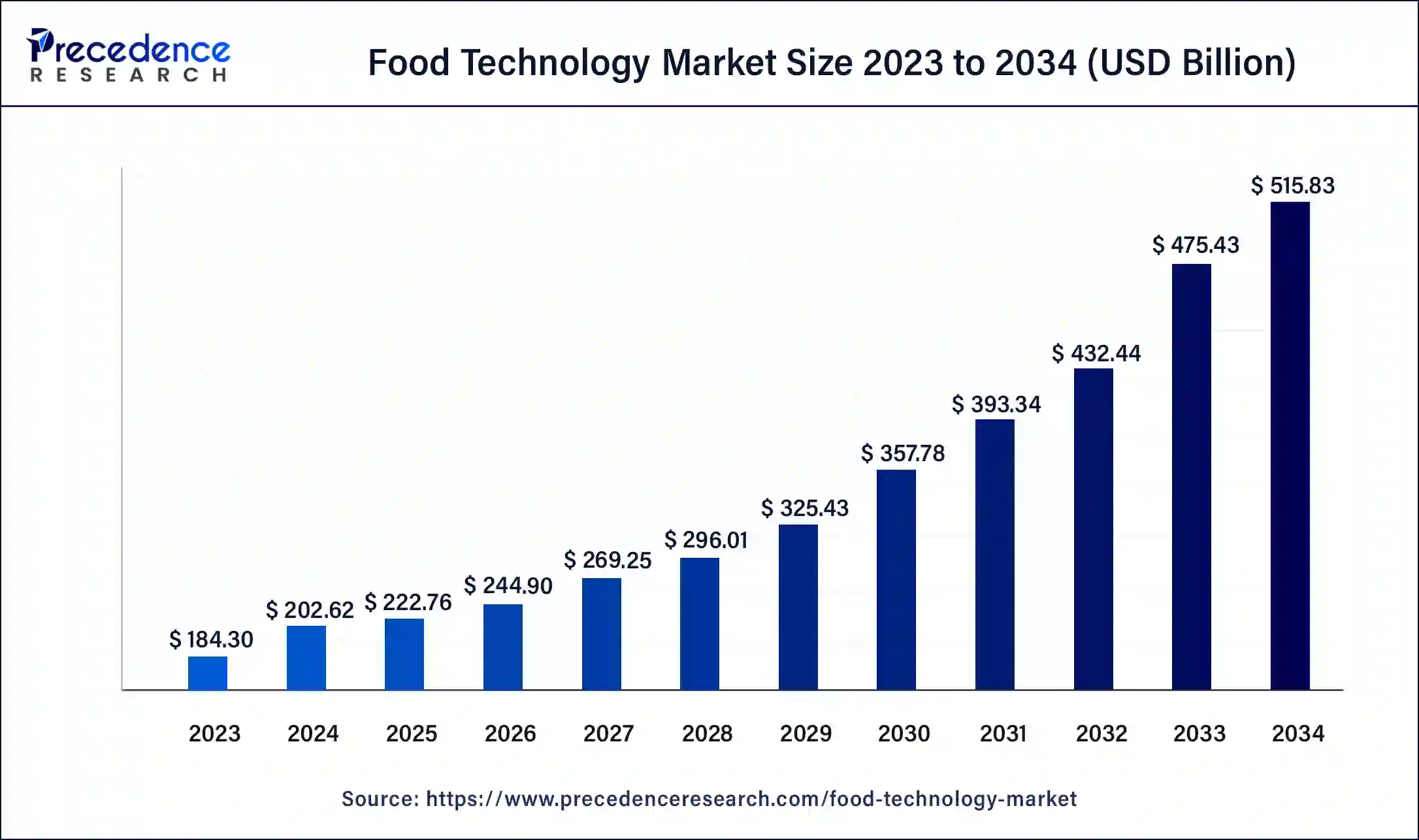The global food technology market size reached USD 184.30 billion in 2023 and is projected to hit around USD 475.43 billion by 2033, growing at a CAGR of 9.94% from 2024 to 2033.
Key Points
- Asia-Pacific has contributed more than 33% of market share in 2023.
- North America is estimated to expand the fastest CAGR between 2024 and 2033.
- By component, the hardware segment held the largest market share of 43% in 2023.
- By component, the software segment is anticipated to grow at a remarkable CAGR of 11.13% between 2024 and 2033.
- By industry, the fish, meat, and seafood segment has accounted over 20% of market share in 2023.
- By industry, the dairy products segment is expected to expand at the fastest CAGR over the projected period.
- By application, the food science management segment has recorded over 27% of market share in 2023.
- By application, the delivery segment is expected to expand at the fastest CAGR over the projected period.

The food technology market has witnessed significant growth in recent years, driven by advancements in technology, changing consumer preferences, and increasing demand for sustainable and healthier food options. Food technology encompasses a wide range of innovations and applications, including food processing, packaging, preservation, and distribution. From the development of plant-based alternatives to the implementation of artificial intelligence in food production, the industry is undergoing rapid transformation to meet the evolving needs of consumers and address global challenges such as food security and environmental sustainability.
Get a Sample:https://www.precedenceresearch.com/sample/4025
Growth Factors:
Several factors contribute to the growth of the food technology market. Firstly, the rising global population and changing dietary habits have increased the demand for convenient and nutritious food products. Additionally, advancements in biotechnology, nanotechnology, and other fields have enabled the development of novel ingredients and processing techniques, leading to improved food quality, safety, and shelf life. Moreover, the growing focus on sustainability and eco-friendly practices has prompted companies to invest in alternative packaging materials, waste reduction strategies, and energy-efficient production methods.
Region Insights:
The food technology market exhibits regional variations influenced by factors such as economic development, cultural preferences, and regulatory frameworks. In developed regions like North America and Europe, technological innovation and consumer demand for premium quality and healthy food options drive market growth. On the other hand, emerging economies in Asia Pacific and Latin America offer immense growth opportunities due to increasing urbanization, rising disposable incomes, and a growing middle-class population. Moreover, government initiatives to modernize food infrastructure and enhance food security further fuel market expansion in these regions.
Food Technology Market Scope
| Report Coverage | Details |
| Growth Rate from 2024 to 2033 | CAGR of 9.94% |
| Global Market Size in 2023 | USD 184.30 Billion |
| Global Market Size by 2033 | USD 475.43 Billion |
| Largest Market | Asia Pacific |
| Base Year | 2023 |
| Forecast Period | 2024 to 2033 |
| Segments Covered | By Component, By Industry, and By Application |
| Regions Covered | North America, Europe, Asia-Pacific, Latin America, and Middle East & Africa |
Food Technology Market Dynamics
Drivers:
Several drivers propel the growth of the food technology market. One of the primary drivers is the increasing awareness of health and wellness among consumers, leading to a growing demand for functional foods, organic products, and dietary supplements. Moreover, the rise of e-commerce and online food delivery platforms has facilitated greater access to a wide variety of food products, driving market expansion. Additionally, technological advancements such as blockchain, IoT (Internet of Things), and machine learning are revolutionizing food traceability, supply chain management, and quality control, thereby boosting market growth.
Opportunities:
The food technology market presents numerous opportunities for innovation and investment. With the rise of alternative protein sources such as plant-based and cell-cultured meats, there is a growing market for sustainable protein alternatives to traditional animal products. Additionally, personalized nutrition and dietary solutions tailored to individual needs offer promising avenues for companies to differentiate their products and capture niche markets. Furthermore, collaborations between food tech startups, research institutions, and established companies can foster the development of cutting-edge technologies and solutions to address key challenges facing the industry.
Challenges:
Despite its promising outlook, the food technology market faces several challenges that hinder its growth potential. One significant challenge is the high initial capital investment required for research and development, infrastructure development, and regulatory compliance. Moreover, concerns regarding food safety, labeling regulations, and consumer acceptance pose hurdles for companies introducing novel food products and technologies. Additionally, issues related to intellectual property rights, supply chain complexities, and ethical considerations surrounding emerging technologies such as genetic engineering and synthetic biology necessitate careful navigation by industry stakeholders.
Read Also: Data Center Power Management Market Size, Share, Report by 2033
Recent Developments
- In July 2023, FarMart, an advanced food supply network, introduced Saudabook, India’s inaugural technological solution for the food processing industry. This groundbreaking platform extended its ERP system, FarMartOS, to all food processors across India, to modernize the nation’s food sector and streamline supply chain processes intelligently.
- In March 2023, CUBIQ FOODS and Cargill, Incorporated, a U.S.-based company, revealed a collaboration to supply innovative fats for plant-based foods. Through this partnership, the companies sought to address the growing demand for healthier ingredients in the market.
Food Technology Market Companies
- Beyond Meat
- Impossible Foods
- Cargill, Incorporated
- Tyson Foods
- Nestlé
- ADM (Archer Daniels Midland Company)
- Kerry Group
- Ingredion
- Tyson Foods
- Danone
- Kraft Heinz
- Givaudan
- Conagra Brands
- The Kellogg Company
- Ingredion Incorporated
Segments Covered in the Report
By Component
- Hardware
- Software
- Services
By Industry
- Fish, Meat, and Seafood
- Fruits and Vegetables
- Grain and Oil
- Dairy Products
- Beverages
- Bakery and Confectionery
- Others
By Application
- Food Science
- Kitchen & Restaurant Tech
- Delivery
- Supply Chain
- Others
By Geography
- North America
- Europe
- Asia-Pacific
- Latin America
- Middle East and Africa
Contact Us:
Mr. Alex
Sales Manager
Call: +1 9197 992 333
Email: sales@precedenceresearch.com
Web: https://www.precedenceresearch.com
Blog: https://www.uswebwire.com/
